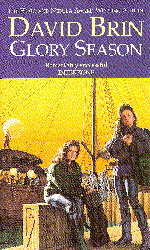|
Glory Season
Copyright 1993 by
I first read this in 1994 and most recently on the 11th January 2007 In the far future, human interstellar culture, the Hominid Phylum, has found another long-lost world. This time the planet is Stratos, settled thousands of years previously by Lysos, a staunch feminist, and her followers. The original colonists wanted to avoid the male urge to destruction and violence. They created a matriarchal colony where the primary reproductive system is parthenogenic. Through this they give birth to daughters, clones of themselves. However some normal sexual reproduction is allowed, so girls and boys are also born who not genetic clones. The original colonists altered women's and men's sexual cycles to limit to activity only part of the year (interestingly in different seasons). And they've been breeding men to be more docile. They may not have had as many wars, violence may be more limited, etc, etc. But my god its a stagnant society, tightly stratified into families and castes. Maia and Leia are two teenage non-clone sisters. They are heading out together, in the tradition of their family, to make their own life. Maia loses her sister and gets imprisoned almost immediately. She falls in with Renna, the representative of the Hominid Phylum who is also a prisoner. You may get the impression that Maia isn't exactly the bees' knees intelligence-wise, but believe me she and her sister way ahead of the clones who form the majority of the population. Maia goes through many adventures trying to rescue Renna and return him to his ship. Too many. luckily. to mention here. I'm shocked. I assumed that Brin wrote this back in 1970's or early 1980's but I was wrong. This was published in 1993. Its style is conventional, so old-fashioned, so dowdy. My feeling may have been partly due to the cover photo. The women pictured bear too close a resemblance to Fergie, Duchess of York, for me to read this story with any comfort. I should have bought the American edition. Brin's imagined world is intelligently thought-provoking but it is a bit boring to actually imagine living in it. It was, however, intended for a younger market. A teenager, fully of youth, energy and the thirst for adventure, may find this novel chock a block with brilliant concepts, exciting incidents, fantastic journeys and strange moralities. It doesn't really bear comparison with Poul Anderson's "Virgin Planet". That was a much better book. It fact they are rather different novels, but "Virgin Planet" is much more fun. With all of "Glory Season"'s emphasis on the importance of sexuality, I had expected, frankly, something a bit more more exciting. For a more modern, sharper and tougher look at the lost-Amazon-colony scenario, read the very good "Carnival" by Elizabeth Bear. Loaded on the 28th February 2007.
|
|






